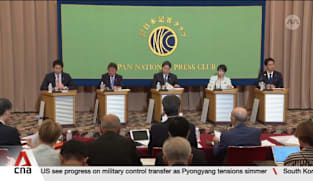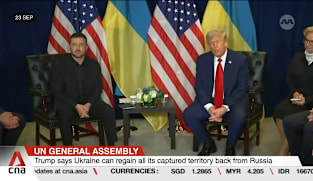Committee of Supply 2023 debate, Day 4: Maliki Osman on shifts in post-secondary pathways on the back of Full SBB
Full Subject-Based Banding (Full SBB) will be fully implemented in secondary schools for the Secondary 1 cohort from next year and streaming will be removed, marking a significant move in the education landscape, said Second Minister for Education Maliki Osman. In line with this shift, the Ministry of Education (MOE) will adjust the admissions criteria for post-secondary pathways to recognise more diverse profiles of learners and provide them with more options, he said. Elaborating on the changes for post-secondary pathways in Parliament on Wednesday (Mar 1), he said the range of post-secondary pathways that students could be eligible for will no longer be limited by streams but by their performance at different subject levels. First, more students will be able to access the Polytechnic Foundation Programme (PFP). Today, it is only open to eligible students from the Normal (Academic) stream. To allow a wider learner profile to benefit from the PFP, access to PFP will be expanded to include students taking G3 subjects or a mix of G3 and G2 subjects. This change will take place from the 2028 PFP intake and the number of students accepted every year could increase up to 2,600 from about 1,700 today. The PFP admissions criteria will be maintained to ensure students continue to have the fundamentals to cope with the rigour of the PFP. MOE will also adopt a cluster-based admissions approach for the PFP from the 2026 intake. Today, students are admitted directly to specific diplomas in their PFP year. In 2026, students will be admitted to broad clusters before choosing a specific diploma in the cluster after their PFP. Students will have more time to make informed choices. Polytechnics can also better match students’ interest and abilities with specific diplomas. Second, MOE will review admissions to Polytechnic Year 1 to better recognise the different subject levels taken by students. For example, students now have to take five G3 subjects to be eligible for Polytechnic Year 1. With Full SBB, some may take subjects at the G2 level. MOE is exploring allowing one G2 subject to be considered for admission. Turning to students in the Institute of Technical Education (ITE), Dr Maliki said they will have more opportunities and flexibility to deepen their skills and competencies through the expansion of ITE diploma offerings. These will enable students to better attain work-ready skills in line with changing industry needs. Dr Maliki said MOE is committed to bringing out the best in every student and supporting them to their full potential.
Full Subject-Based Banding (Full SBB) will be fully implemented in secondary schools for the Secondary 1 cohort from next year and streaming will be removed, marking a significant move in the education landscape, said Second Minister for Education Maliki Osman. In line with this shift, the Ministry of Education (MOE) will adjust the admissions criteria for post-secondary pathways to recognise more diverse profiles of learners and provide them with more options, he said. Elaborating on the changes for post-secondary pathways in Parliament on Wednesday (Mar 1), he said the range of post-secondary pathways that students could be eligible for will no longer be limited by streams but by their performance at different subject levels. First, more students will be able to access the Polytechnic Foundation Programme (PFP). Today, it is only open to eligible students from the Normal (Academic) stream. To allow a wider learner profile to benefit from the PFP, access to PFP will be expanded to include students taking G3 subjects or a mix of G3 and G2 subjects. This change will take place from the 2028 PFP intake and the number of students accepted every year could increase up to 2,600 from about 1,700 today. The PFP admissions criteria will be maintained to ensure students continue to have the fundamentals to cope with the rigour of the PFP. MOE will also adopt a cluster-based admissions approach for the PFP from the 2026 intake. Today, students are admitted directly to specific diplomas in their PFP year. In 2026, students will be admitted to broad clusters before choosing a specific diploma in the cluster after their PFP. Students will have more time to make informed choices. Polytechnics can also better match students’ interest and abilities with specific diplomas. Second, MOE will review admissions to Polytechnic Year 1 to better recognise the different subject levels taken by students. For example, students now have to take five G3 subjects to be eligible for Polytechnic Year 1. With Full SBB, some may take subjects at the G2 level. MOE is exploring allowing one G2 subject to be considered for admission. Turning to students in the Institute of Technical Education (ITE), Dr Maliki said they will have more opportunities and flexibility to deepen their skills and competencies through the expansion of ITE diploma offerings. These will enable students to better attain work-ready skills in line with changing industry needs. Dr Maliki said MOE is committed to bringing out the best in every student and supporting them to their full potential.



















